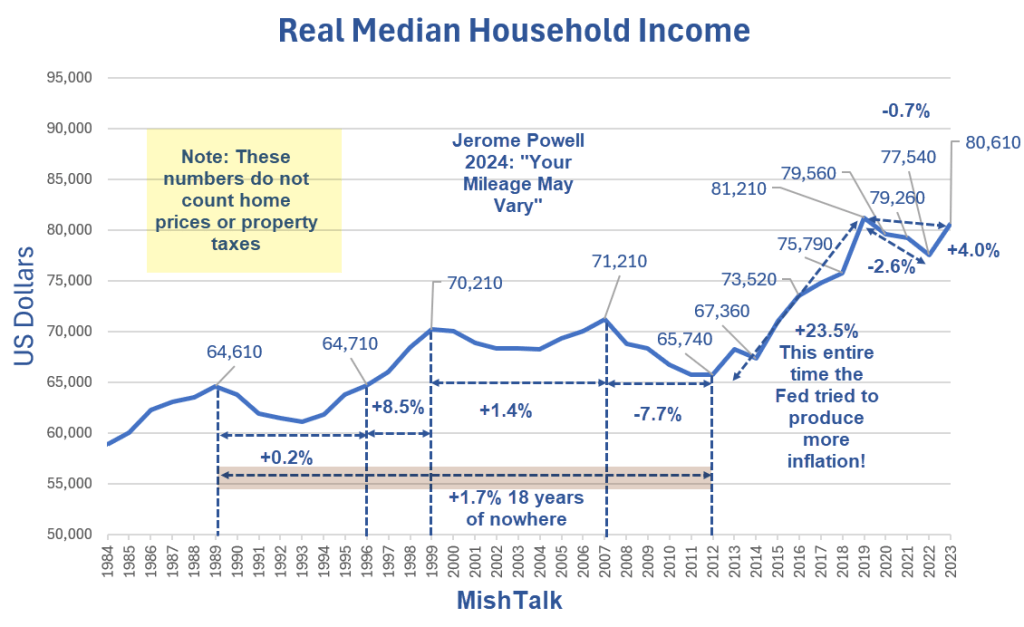Last week the Census Department released real median household income for 2023. Let’s investigate.

The Census Department reports Median Income of Non-Hispanic White Households Increased While Asian, Black and Hispanic Median Household Income Did Not Change
Real median household income rose to $80,610 in 2023, the first annual increase since 2019 before the COVID-19 pandemic, according to a U.S. Census Bureau report released today.
The 2023 median incomes of Hispanic ($65,540) and Black ($56,490) households were not statistically different from 2022 and remained the lowest among all race and ethnic groups.
Real means inflation adjusted.
Real Median Income Chart Comments
- Real median income rose a total of 1.7 percent for 18 years between 1989 and 2012, less than a tenth of a percent per year. But that does not factor in home prices or property taxes.
- Between 1999 and 2012, real median income fell 6.3 percent.
- In a stunning period between 2012 and 2019 real median household income allegedly rose 23.5 percent. Janet Yellen perceived this as her biggest failure.
Yellen’s Only Regret as Fed chair: Low Inflation
Flashback December 13, 2017: Yellen’s only regret as Fed chair: Low inflation
At her final news conference as Fed chair Wednesday, Yellen said the Fed’s failure to bring inflation up to the central bank’s 2 percent mandate is her single disappointment.
“We have a 2 percent symmetric inflation objective. For a number of years now, inflation has been running under 2 percent, and I consider it an important priority to make sure that inflation doesn’t chronically undershoot our 2 percent objective,” she said.
For years, various Fed officials commented on the need to make up for lack of prior inflation.
The only time consumers got ahead is when the Fed failed to produce the inflation it wanted!
Factoring in house prices and taxes, one can debate how much consumers really benefitted, but inflation only benefits those with first access to money (the banks, government, and the already wealthy).
Economic Challenge to Keynesians
Of all the widely believed but patently false economic beliefs is the absurd notion that falling consumer prices are bad for the economy and something must be done about them.
I have commented on this many times and have been vindicated not only by sound economic theory but also by actual historical examples.
My Challenge to Keynesians “Prove Rising Prices Provide an Overall Economic Benefit” has gone unanswered.
There is no answer because history and logic both show that concerns over consumer price deflation are seriously misplaced.
BIS Deflation Study
The BIS did a historical study and found routine deflation was not any problem at all.
For a discussion of the BIS study, please see Historical Perspective on CPI Deflations: How Damaging are They?
“Deflation may actually boost output. Lower prices increase real incomes and wealth. And they may also make export goods more competitive,” stated the study.
It’s asset bubble deflation that is damaging. When asset bubbles burst, debt deflation results.
Central banks’ seriously misguided attempts to defeat routine consumer price deflation is what fuels the destructive asset bubbles that eventually collapse.